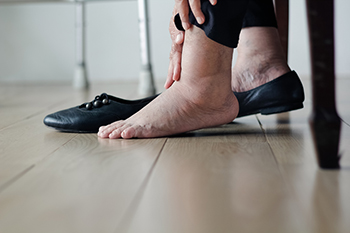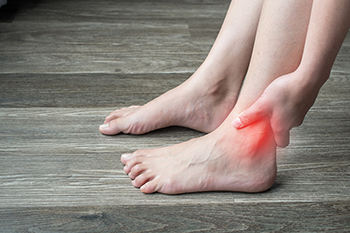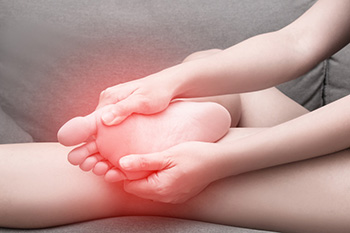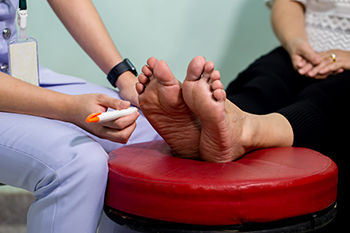NJ (908) 688-5577
NY (212) 737-2528

Many older adults experience some degree of swelling in the feet, ankles, and lower legs. This can cause a senior to become less certain on their feet, thereby increasing the risk of falling, and this may lead to a more sedentary lifestyle. Swelling, or edema, in seniors is frequently the result of retention of fluid in the lower extremities. It can be caused by underlying conditions, such as congestive heart failure or other heart-related problems, chronic kidney disease, rheumatoid arthritis, and vascular problems. A number of simple lifestyle changes can help to reduce edema. Among them are wearing compression socks or stockings, avoiding shoes that are too tight, and keeping the legs elevated as often as possible. Moving the feet, toes, and ankles is important, as sitting or standing in one place for too long can increase swelling. Performing simple ankle rotations or flexes can be beneficial. Eating foods rich in magnesium, such as legumes, fresh vegetables and leafy greens, and whole grains, may also help. If swelling in the feet becomes a chronic problem, it is suggested that you consult a podiatrist for an exam and diagnosis.
Swollen feet can be a sign of an underlying condition. If you have any concerns, contact Glenn Davison, DPM of Advanced Podiatry. Our doctor can provide the care you need to keep you pain-free and on your feet.
Swollen feet are a common ailment among pregnant women and people who stand or sit for extended periods. Aging may increase the possibility of swollen feet and patients who are obese often notice when their feet are swelling too. There may be medical reasons why swollen feet occur:
Swollen feet can also be caused by bone and tendon conditions, including fractures, arthritis, and tendinitis. Additionally, there may be skin and toenail conditions and an infection may cause the feet to swell. Patients who take medicine to treat high blood pressure may be prone to getting swollen feet.
Many patients elevate their feet to help relieve the swelling and this is generally a temporary remedy. When a podiatrist is consulted the reason behind the swelling can be uncovered and subsequently treated.
If you have any questions please feel free to contact our offices located in Union, NJ and New York . We offer the newest diagnostic tools and technology to treat your foot and ankle needs.

One can have ankle pain even if they have not injured their ankle. This can occur from some underlying health conditions, such as autoimmune diseases or arthritis, and from unrelated foot ailments. Osteoarthritis, the most common form of arthritis, is when the cartilage between two bones erodes over time. Without cartilage in the ankle, the bones rub together and there can be pain and stiffness. Other types of arthritis, including rheumatoid arthritis, reactive arthritis, and gout are other conditions that can cause inflammation and leave the ankle feeling tender as well. Lupus and scleroderma are examples of autoimmune diseases that can have the same side effects. Of course, other foot and ankle ailments, like fallen arches and Achilles tendonitis can also cause ankle pain. Treatment depends on the root cause of the ankle pain. If you have such pain and there is no obvious reason for it, it is suggested that you see a podiatrist for a correct diagnosis and care regime.
Ankle pain can have many different causes and the pain may potentially be serious. If you have ankle pain, consult with Glenn Davison, DPM from Advanced Podiatry. Our doctor will assess your condition and provide you with quality foot and ankle treatment.
Ankle pain is any condition that causes pain in the ankle. Due to the fact that the ankle consists of tendons, muscles, bones, and ligaments, ankle pain can come from a number of different conditions.
Causes
The most common causes of ankle pain include:
Symptoms
Symptoms of ankle injury vary based upon the condition. Pain may include general pain and discomfort, swelling, aching, redness, bruising, burning or stabbing sensations, and/or loss of sensation.
Diagnosis
Due to the wide variety of potential causes of ankle pain, podiatrists will utilize a number of different methods to properly diagnose ankle pain. This can include asking for personal and family medical histories and of any recent injuries. Further diagnosis may include sensation tests, a physical examination, and potentially x-rays or other imaging tests.
Treatment
Just as the range of causes varies widely, so do treatments. Some more common treatments are rest, ice packs, keeping pressure off the foot, orthotics and braces, medication for inflammation and pain, and surgery.
If you have any questions, please feel free to contact our offices located in Union, NJ and New York . We offer the newest diagnostic and treatment technologies for all your foot care needs.

Almost everyone has felt some type of foot pain in their life, especially if they are physically active. However, foot pain also may be caused by genetics, diet, obesity, and infections. The most common causes of foot pain include bunions, hammertoes, and corns. Gout, flat feet, and plantar warts are other painful foot conditions. In addition, athlete’s foot, toenail fungus, and ingrown toenails are common foot pain complaints. Many of these conditions can be resolved by taking better care of the feet on a daily basis, as well as wearing shoes that fit the feet properly. Gout, however, is an inflammatory condition that results from having an excess of uric acid in the body. Omitting foods high in purines can help to prevent it. Infections are often transmitted in pool or gym locker rooms, with protective footwear they can be avoided. Caring for the toenails by cutting them properly may diminish the chances of an ingrown toenail. If you are experiencing foot pain that impedes your daily activities, it is suggested that you visit a podiatrist for help.
Foot Pain
Foot pain can be extremely painful and debilitating. If you have a foot pain, consult with Glenn Davison, DPM from Advanced Podiatry. Our doctor will assess your condition and provide you with quality foot and ankle treatment.
Causes
Foot pain is a very broad condition that could be caused by one or more ailments. The most common include:
Diagnosis
To figure out the cause of foot pain, podiatrists utilize several different methods. This can range from simple visual inspections and sensation tests to X-rays and MRI scans. Prior medical history, family medical history, and any recent physical traumatic events will all be taken into consideration for a proper diagnosis.
Treatment
Treatment depends upon the cause of the foot pain. Whether it is resting, staying off the foot, or having surgery; podiatrists have a number of treatment options available for foot pain.
If you have any questions, please feel free to contact our offices located in Union, NJ and New York . We offer the newest diagnostic and treatment technologies for all your foot care needs.

Diabetics can be in danger of foot and toe problems as a result of sustained high blood sugar levels. Commonly, diabetes causes neuropathy in the lower extremities, which results in numbness and can put the patient in danger of developing a foot ulcer. Because the feeling in the feet is limited or absent, cuts, sores, and cracks in the skin may go unnoticed. Another underlying condition, called peripheral artery disease, can clog the blood vessels in the feet, making it more difficult for any such injuries to heal. This combination can lead to skin ulcers that if not attended to can cause gangrene. Experts suggest a daily foot care regime that can prevent ulcers from forming. It includes washing and drying the feet daily, inspecting them for sores, wearing shoes that are comfortable and fit well, and avoiding going barefoot. Keep the feet elevated when possible and perform light foot exercises, such as wiggling the toes and rotating the ankles to get the circulation going. If you have noticed a sore on your foot that is taking a long time to heal, it is suggested that you make an appointment with a podiatrist.
Diabetic foot care is important in preventing foot ailments such as ulcers. If you are suffering from diabetes or have any other concerns about your feet, contact Glenn Davison, DPM from Advanced Podiatry. Our doctor can provide the care you need to keep you pain-free and on your feet.
Diabetic Foot Care
Diabetes affects millions of people every year. The condition can damage blood vessels in many parts of the body, especially the feet. Because of this, taking care of your feet is essential if you have diabetes, and having a podiatrist help monitor your foot health is highly recommended.
The Importance of Caring for Your Feet
Patients with diabetes should have their doctor monitor their blood levels, as blood sugar levels play such a huge role in diabetic care. Monitoring these levels on a regular basis is highly advised.
It is always best to inform your healthcare professional of any concerns you may have regarding your feet, especially for diabetic patients. Early treatment and routine foot examinations are keys to maintaining proper health, especially because severe complications can arise if proper treatment is not applied.
If you have any questions please feel free to contact our offices located in Union, NJ and New York . We offer the newest diagnostic and treatment technologies for all your foot and ankle needs.